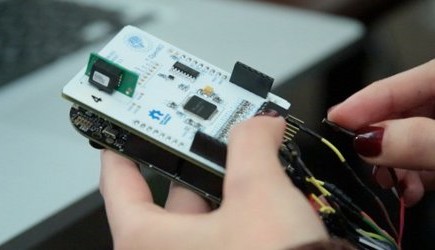Open Source Brain Computer Interface for Arduino
December 20, 2013
on
on

OpenBCI enables makers to get in to the fascinating field of mind controlled devices.
Consumer grade BCI's like the NeuroSky Mindwave and Emotiv EPOC have been available on the market for quite some time now and used for innovative applications like brain controlled games, skate boards and multitasking aides. However, these neuroheadsets are proprietary devices with limited access to the hardware and source code.
OpenBCI creators Joel Murphy and Conor Russomanno developed an open source BCI because they believe the future of brain research and mind controlled devices should not be in the hands of a few companies and scientists but open to anyone who is interested. They are now running a crowfunding campaign on Kickstarter to start mass producing the boards.
OpenBCI is an EEG signal capture platform. The hardware consists of an Arduino compatible board and ten electrodes. The electrodes are placed on the scalp to record the brain signals. The OpenBCI board amplifies the signals and sends them to a computer. The OpenBCI Brainwave visualizer software translates the raw EEG data into a human readable format.
You can analyze your brain waves with OpenBCI which is pretty cool but it wouldn't be a brain-computer interface if it didn't enable you to control stuff with your mind. 'We have broken out all of the pins so you can blink lights or move motors just like with Arduino except now you can do it with your brainwaves!', Murphy and Russomanno write on their Kickstarter page.
The hardware is open for those who want to hone their hardware hacking skills. For those daunted by such a task code libraries are available. Signal processing algorithms and raw EEG data are accessible and can therefore be made compatible with existing open source EEG signal processing applications.
You can pre-order OpenBCI for $324 at the kickstarter page. Estimated delivery is in the spring of 2014.
OpenBCI kickstarter video.
Consumer grade BCI's like the NeuroSky Mindwave and Emotiv EPOC have been available on the market for quite some time now and used for innovative applications like brain controlled games, skate boards and multitasking aides. However, these neuroheadsets are proprietary devices with limited access to the hardware and source code.
OpenBCI creators Joel Murphy and Conor Russomanno developed an open source BCI because they believe the future of brain research and mind controlled devices should not be in the hands of a few companies and scientists but open to anyone who is interested. They are now running a crowfunding campaign on Kickstarter to start mass producing the boards.
OpenBCI is an EEG signal capture platform. The hardware consists of an Arduino compatible board and ten electrodes. The electrodes are placed on the scalp to record the brain signals. The OpenBCI board amplifies the signals and sends them to a computer. The OpenBCI Brainwave visualizer software translates the raw EEG data into a human readable format.
You can analyze your brain waves with OpenBCI which is pretty cool but it wouldn't be a brain-computer interface if it didn't enable you to control stuff with your mind. 'We have broken out all of the pins so you can blink lights or move motors just like with Arduino except now you can do it with your brainwaves!', Murphy and Russomanno write on their Kickstarter page.
The hardware is open for those who want to hone their hardware hacking skills. For those daunted by such a task code libraries are available. Signal processing algorithms and raw EEG data are accessible and can therefore be made compatible with existing open source EEG signal processing applications.
You can pre-order OpenBCI for $324 at the kickstarter page. Estimated delivery is in the spring of 2014.
OpenBCI kickstarter video.
Read full article
Hide full article



Discussion (4 comments)
Anirban Sengupta 11 years ago
Tessel Renzenbrink 11 years ago
sarath 10 years ago
Rejane 9 years ago